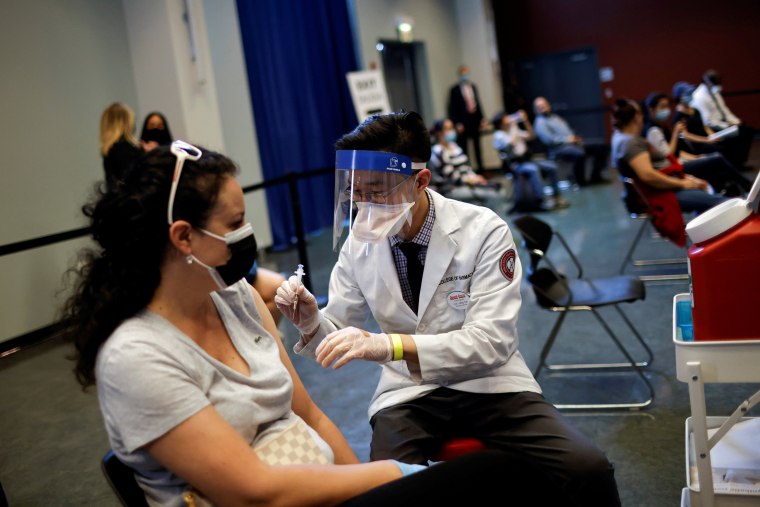Federal inspectors identified a series of problems at the Baltimore facility where the ingredients for up to 15 million doses of Johnson & Johnson vaccine were ruined, according to a Food and Drug Administration report obtained by NBC News.
The report, known as FDA Form 483, says the plant operated by Emergent BioSolutions “is not maintained in a clean and sanitary condition.” Inspectors found peeling paint and unidentified black and brown residue on the floors and walls, as well as a failure to properly decontaminate waste generated during the manufacture of the vaccine drug substance.
“Such waste is transported through the warehouse before disposal and has the potential to contaminate the warehouse and adjacent areas,” the report says.
Emergent BioSolutions has “failed to adequately train personnel involved in manufacturing operations, quality control sampling, weigh and dispense, and engineering operations to prevent cross-contamination of bulk drug substances,” the FDA inspectors also said in the 13-page report obtained through a Freedom of Information Act request.
The inspection, which was completed Tuesday, came after Emergent BioSolutions workers mixed up the ingredients of the AstraZeneca and Johnson & Johnson vaccines. The snafu was first reported by the New York Times on March 31. Johnson & Johnson reported that night that a batch of its key vaccine ingredient didn’t meet quality control standards at the Baltimore plant.
The mix-up did not impact any Johnson & Johnson doses in circulation in the U.S. — those were produced in the Netherlands — but it did delay future shipments.
The FDA report cited a total of nine “observations” at the facility that the agency said have the potential to lead to “quality issues during the manufacturing of a product.” In addition to the unsanitary conditions at the plant, the observations include:
- The cross-contamination of the ingredients has not been “thoroughly investigated.”
- The building is not of “suitable size, design and location.”
- “Written process control procedures” “to prevent cross-contamination” are “not documented.”
- Components for the vaccine ingredients are not stored properly.
- “Written procedures” to maintain integrity of substances are “inadequate.”
- A failure to conduct appropriate training.
- Equipment is not of adequate size.
- Equipment is not adequately cleaned.
The FDA said Emergent BioSolutions has agreed to pause new production while it works with the agency to “resolve potential quality issues.”
“For the vaccines already manufactured, the products will undergo additional testing and will be thoroughly evaluated to ensure their quality before any potential distribution,” the FDA said in a statement. “We will not allow the release of any product until we feel confident that it meets our expectations for quality.”
A spokesperson for Emergent BioSolutions said: “The FDA’s feedback will help continue to improve and strengthen the supply chain for Johnson & Johnson’s vaccine. While we are never satisfied to see shortcomings in our manufacturing facilities or process, they are correctable and we will take swift action to remedy them.”
Johnson & Johnson said in a statement that it will work to ensure “all of FDA’s observations are addressed promptly and comprehensively.”
“The Company will also redouble its efforts as it continues to work toward securing Emergency Use Authorization in the United States for drug substance manufactured at Emergent Bayview as quickly as possible, so that the Company can help bring an end to this global pandemic,” the statement added.
The FDA noted that its actions are unrelated to the ongoing evaluation of the Johnson & Johnson vaccine related to “extremely rare” cases of a specific type of blood clot reported in people who had received doses. Last week, federal health authorities recommended a pause on administering the vaccine amid the investigation into the reports of blood clots.

